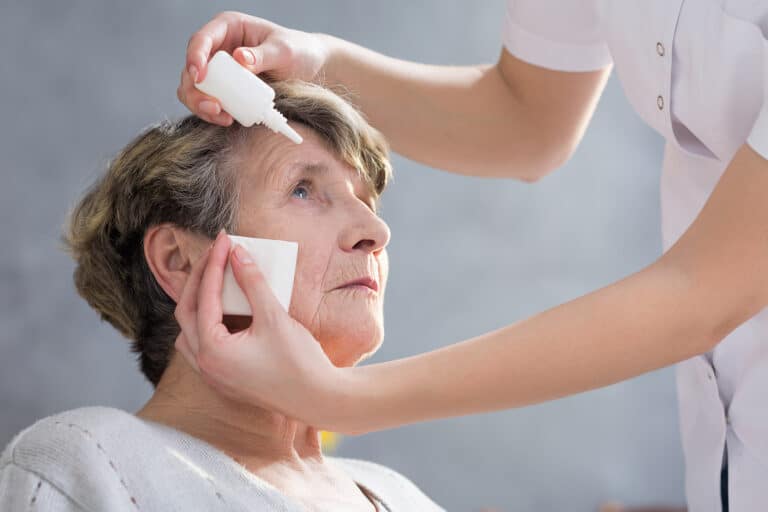Cataract surgery is a fairly common surgery for the elderly. During cataract surgery, the lens of the eye is removed and replaced with an intraocular lens. It is performed generally when someone begins to notice that their vision is blurred or cloudy. While a person may have a cataract for years beforehand, surgery usually doesn’t happen until that cataract begins to obscure the natural vision of a person. It is the only known way to treat cataracts and generally doesn’t pose any complications, but it will take time for the eye to heal and for your loved one to be able to perform certain tasks on her own again.
Recovery from cataract surgery is usually complication-free, but your elderly loved one will need help with some tasks and chores until she is fully recovered – at about four weeks. She may begin to see better within a few days but her eye will need time to fully heal so that infection or retinal detachment does not occur. If your loved one lives on her own, a 24-hour home care team can help her around the clock as she recovers.
Four Things to Avoid While Recovering from Cataract Surgery
1. Driving. It seems to go without saying that if you can’t see, you shouldn’t drive. Having a 24-hour home care provider around means that your loved one will always have someone there to drive her where she needs to go, whether it’s a planned appointment or an impromptu trip to the store.
2. Lifting. On the other hand, many people may not realise that after a cataract surgery, your loved one should avoid any type of heavy lifting or strenuous activities for several weeks (like shovelling snow, mowing the lawn, or carrying heavy loads of groceries up the stairs). Heavy exertion can build up pressure in the eye which can interfere with the healing of the incision.
3. Dust/Sand/Pollen. Your loved one needs to do her best to keep any irritants out of her eyes for those first few weeks of healing. The doctor may recommend wraparound sunglasses to protect her eyes outside and even an eye shield to wear while sleeping. These protective devices might make navigating around the home a little more difficult and a 24-hour home care provider can be there to help her get safely from one area of the home to the next.
4. Showering. Your loved one should avoid having any water getting into her eyes before they are healed. She might need the help of a 24-hour home care team with bathing or washing up until it’s completely healed.
The doctor will prescribe eye drops and possibly other medication for your loved one to take while recovering. If she needs help administering eye drops or reminders to take her medications regularly, a 24-hour home care team can step in to make sure she is taking good care of herself while she recovers from the surgery. They will also be available in case she does have any complications from the surgery such as pain, a discharge, or worsening vision. It can be a comfort to you to know someone is there to help her through whatever is needed as she recovers.
If you or an ageing loved one are considering 24-hour home care in Spruce Grove, please contact the caring staff at Serving Hands Senior Care today. Call (780) 963-1516
Premiere Home Health and Senior Home Care services in Spruce Grove, Stony Plain, Devon, St. Albert, Edmonton, Onoway, Leduc, Parkland County and surrounding communities since 2016.
- Getting Everything Done with Gentle Morning Routines - January 28, 2025
- Four Ways To Show Empathy Toward Someone With A Chronic Illness - December 21, 2024
- Encouraging Independence Through Alzheimer’s Home Care - December 6, 2024








